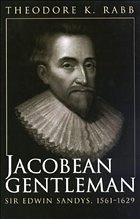Nicht lieferbar

Jacobean Gentleman
Sir Edwin Sandys, 1561-1629
Versandkostenfrei!
Nicht lieferbar
Weitere Ausgaben:
Theodore K. Rabb, one of the leading historians of early modern Europe, presents here the first full-scale biography of the influential English parliamentarian, colonizer, and religious thinker Sir Edwin Sandys (1561-1629). Rabb has studied Sandys's life and work for more than thirty years and shows that he played a vital role in the Jacobean Age's two most distinctive achievements: the early development of England's constitutional structure and the overseas expansion that began the British empire.Sandys made his contributions, Rabb demonstrates, in the course of an extraordinarily diverse car...
Theodore K. Rabb, one of the leading historians of early modern Europe, presents here the first full-scale biography of the influential English parliamentarian, colonizer, and religious thinker Sir Edwin Sandys (1561-1629). Rabb has studied Sandys's life and work for more than thirty years and shows that he played a vital role in the Jacobean Age's two most distinctive achievements: the early development of England's constitutional structure and the overseas expansion that began the British empire.
Sandys made his contributions, Rabb demonstrates, in the course of an extraordinarily diverse career. Sandys sat in the House of Commons from the 1580s to the mid-1620s, becoming its elder statesman and most influential voice on economic affairs, constitutional issues, and parliamentary procedure. He was a leader of the Virginia Company and the Bermuda Company, which established and settled these two early English colonies, and was also a director of the East India Company. And in an age beset by religious extremism, Sandys wrote a book on religious toleration that was widely read and discussed throughout Europe. reassessment of parliamentary politics on the eve of the English Civil War. Rabb shows that Sandys helped shape gentry positions, independent of Crown or Court, on major political issues, which in turn gave the House of Commons a new prominence in English affairs. This long-needed work will prompt a reexamination of vital aspects of the constitutional, colonial, and religious history of the Stuart period.
Table of contents:
Preface ix
Abbreviations xiii
PART ONE: Early Years
CHAPTER I The Setting and the Man 3
CHAPTER II Writings, outlook, and Personality 21
PART TWO: Parliament
CHAPTER III The "Commons-Man" 57
CHAPTER IV 1604: The New King and His "Free Subjects" 68
CHAPTER V "Dissent Is Always Displeasing": The Sessions of 1606 and 1607 111
CHAPTER VI The Great Contract 140
CHAPTER VII "Not Many Arguments, but Strong": The Addled Parliament 174
CHAPTER VIII The Parliament of 1621: Harmony and Hard Work, February to April 209
CHAPTER IX The Parliament of 1621: Descent into Conflict, May to December 241
CHAPTER X The M.P. Victorious: Buckingham and the Parliament of 1624 270
CHAPTER XI Farewell to Parliament 304
PART THREE: Commerce and Colonization
CHAPTER XII Overseas Ventures 319
CHAPTER XIII Collapse in Virginia 353
PART FOUR: Jacobean Gentleman
CHAPTER XIV The Measure of the Man 389
Index 399
Sandys made his contributions, Rabb demonstrates, in the course of an extraordinarily diverse career. Sandys sat in the House of Commons from the 1580s to the mid-1620s, becoming its elder statesman and most influential voice on economic affairs, constitutional issues, and parliamentary procedure. He was a leader of the Virginia Company and the Bermuda Company, which established and settled these two early English colonies, and was also a director of the East India Company. And in an age beset by religious extremism, Sandys wrote a book on religious toleration that was widely read and discussed throughout Europe. reassessment of parliamentary politics on the eve of the English Civil War. Rabb shows that Sandys helped shape gentry positions, independent of Crown or Court, on major political issues, which in turn gave the House of Commons a new prominence in English affairs. This long-needed work will prompt a reexamination of vital aspects of the constitutional, colonial, and religious history of the Stuart period.
Table of contents:
Preface ix
Abbreviations xiii
PART ONE: Early Years
CHAPTER I The Setting and the Man 3
CHAPTER II Writings, outlook, and Personality 21
PART TWO: Parliament
CHAPTER III The "Commons-Man" 57
CHAPTER IV 1604: The New King and His "Free Subjects" 68
CHAPTER V "Dissent Is Always Displeasing": The Sessions of 1606 and 1607 111
CHAPTER VI The Great Contract 140
CHAPTER VII "Not Many Arguments, but Strong": The Addled Parliament 174
CHAPTER VIII The Parliament of 1621: Harmony and Hard Work, February to April 209
CHAPTER IX The Parliament of 1621: Descent into Conflict, May to December 241
CHAPTER X The M.P. Victorious: Buckingham and the Parliament of 1624 270
CHAPTER XI Farewell to Parliament 304
PART THREE: Commerce and Colonization
CHAPTER XII Overseas Ventures 319
CHAPTER XIII Collapse in Virginia 353
PART FOUR: Jacobean Gentleman
CHAPTER XIV The Measure of the Man 389
Index 399




